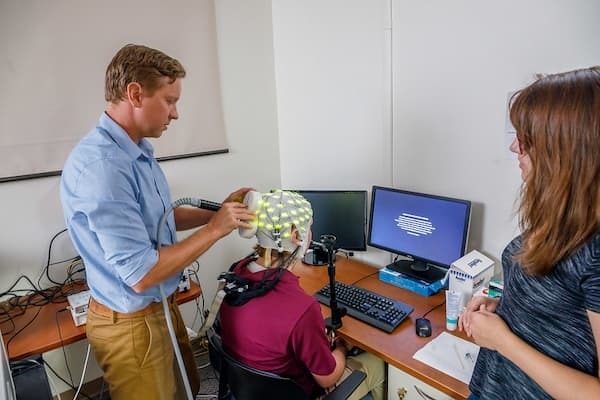About

The Department of Psychology at Notre Dame is a community of scholars and learners seeking to reveal and understand the principles and mechanisms that give rise to human behavior. Using basic, applied, and clinical research methods, our faculty and students develop novel theories of behavior, connect behavior to brain function, and develop evidence-based approaches to the treatment of behavioral disorders.
Notre Dame's psychology department is deeply committed to diversity, equity, and inclusion and to providing a welcoming environment where all can flourish. In alignment with the University's mission, we strive through our research and teaching "to create a sense of human solidarity and concern for the common good that will bear fruit as learning becomes service to justice."
Distinguished faculty
Our department is home to more than 30 faculty members who are rising stars and world-renowned researchers. Their research is highly and broadly cited and is supported by the National Science Foundation, the National Institutes of Health, and a variety of charitable research foundations. In addition to being experts in their fields, our faculty are elected fellows in learned societies, leaders of national and international professional organizations, editors of important journals, talented teachers and mentors, and dedicated clinicians.
Rigorous research
Laboratory-based research is central to the mission of the department. Faculty conduct and supervise research alongside post-doctoral fellows, doctoral students, undergraduate research assistants, and other project-based support staff. In addition to answering cutting-edge questions, our research enterprise is an important training opportunity for undergraduate students whose own research often leads to senior theses, presentations at professional meetings, and scholarly publications. Notre Dame is home to more than 30 psychology research labs — focused on everything from sleep, stress, and memory to visual cognition to suicide prevention.
Graduate Programs

Our doctoral program houses approximately 60 students and is comprised of four signature content areas:
- clinical science
- cognition, brain, and behavior
- developmental psychology
- quantitative psychology
We also offer two joint doctoral programs with peace studies and computer science. In addition to obtaining knowledge and skills specific to one’s chosen area of specialization, all students receive intensive training in research methods, psychological measurement, and statistical analysis.
No matter which area of focus you choose, you will work alongside and learn from faculty who are leading experts in their field, outstanding teachers, and caring mentors.
Undergraduate Education
The department houses two innovative and engaging undergraduate majors that together make our department one of the largest communities of undergraduate students in the College of Arts and Letters.
- The Psychology major offers students a holistic program that explores physiological, neurological, cognitive, developmental, clinical, and social aspects of behavior.
- The Neuroscience and Behavior major provides students with a more interdisciplinary educational experience as they study the structure and function of the nervous system and how neural activity gives rise to behavioral and mental phenomena.
Both undergraduate majors offer a curriculum that emphasizes quantitative skills and research methods and many students work alongside faculty members as valued collaborators on research projects. Our graduates are sought-after by graduate/professional schools, corporations, government agencies, and non-profits because they understand the individual, family, and community pressures that shape behavior; develop outstanding critical thinking and communication skills, and have a sophisticated ability to collect, analyze, and interpret data.
Many students work alongside faculty members as collaborators in research, working in labs as a valued protégé, writing and publishing, and developing skills in the tools of science. This training is the distinctive mark of excellence of the Notre Dame Psychology undergraduate experience.
Community Services
Our department offers a range of psychological services to residents of South Bend and its surrounding communities through our Psychological Services Center and the Shaw Center for Children and Families. These centers offer low-cost mental health services while also serving as training and research hubs for our doctoral students and faculty. Our clients do not need to be affiliated with Notre Dame to receive therapy or assessment. We offer adult therapy (individual and marital), child and family therapy, and child assessment. We do not offer emergency services or prescription medications. If you are in crisis, please call the Suicide and Crisis Lifeline by dialing 988 or go to your closest hospital emergency room.
Community members are also welcome to participate in research projects, helping Notre Dame faculty better understand the mind, brain, and human behavior.
Facilities
The psychology department's academic hub is located in Corbett Family Hall on the east side of Notre Dame Stadium. Built in 2017, this facility was specifically designed for the department. Spanning three floors and more than 100,000 square feet, it houses faculty and departmental offices, research labs, and classrooms.
The department also maintains two off-campus facilities in South Bend. The William J. Shaw Center for Children and Families is located on Ironwood Road and the Notre Dame Psychological Services Center is located on Hill Street. Both facilities offer clinical services as well as platforms for conducting community-based research.